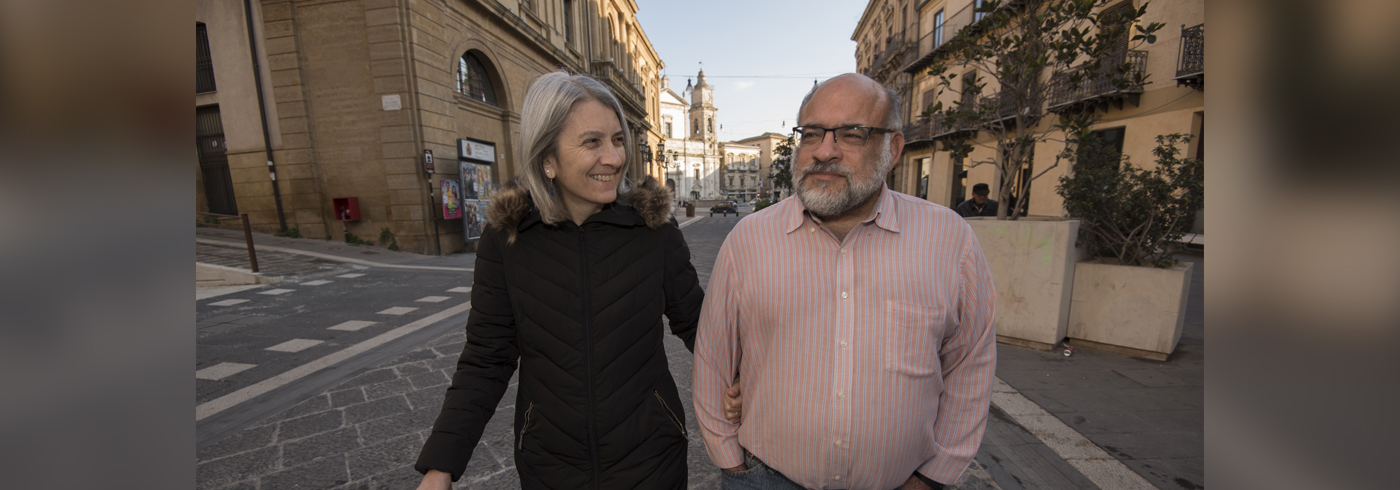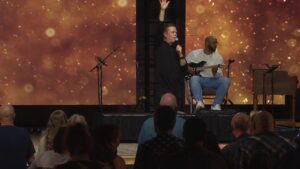House of Refuge
 Neil and Kathy Vanaria cultivate relationships with traumatized refugees.
Neil and Kathy Vanaria cultivate relationships with traumatized refugees.
Assemblies of God world missionaries Neil and Kathy Vanaria are no strangers to hard places and great challenges. For 25 years, they served in remote villages spread through the mountains and jungles of Papua New Guinea, an island nation north of Australia. That work culminated in 2013 with the completion of a New Testament translated into the Mesem language.
In 2016, the Vanarias transitioned to service in Sicily. They quickly took to heart the plight of those arriving on the Italian island in the Mediterranean following the horrors of war in their homelands and the trauma of open-ocean voyages.
“Relief often gives way to despair when they realize that promises made to them by human smugglers — including guaranteed income and free housing — do not exist,” Kathy says. “They find themselves trapped.”
“Southern Italy is a main landing point,” says Neil. “Whether they are refugees fleeing violence or migrants looking for better economic opportunities, there is no difference in how we minister to them.”
Since arriving in Sicily, the Vanarias have opened two ministry locations under the name Casa Di Rifugio (House of Refuge). The first opened in February 2017 close to the Mineo refugee camp, Europe’s largest at that time, serving primarily Africans. As the Vanarias ministered the gospel openly, they heard about the horrors refugees faced crossing Libya: potential death in desert or in the sea.
For women, the journey is especially brutal. Of the numerous women refugees they have met, Neil and Kathy know of only two who haven’t been stripped, raped, and robbed.
“Men and women alike are kidnapped and locked in shipping containers in the desert,” Kathy says. “They are held for ransom. If their families at home do not pay, the refugee and the family are shot.”
The Vanarias worked tirelessly among the Mineo camp’s arrivals until the camp closed in 2019.
BREAKING THROUGH ISOLATION
The second Casa Di Rifugio opened in April 2018 in Caltanissetta, home to one of the largest populations of immigrants from the Middle East and Southern Asia. The center offers laundry services, hot showers, food, clothing assistance, Bible studies, and English classes for children.
Many attendees at Caltanissetta’s Casa are more strongly connected to Islam than those at Mineo, the Vanarias say. Because Islam prohibits men and women from interacting in most public settings, Neil and Kathy and their team have developed gender-specific outreaches.
“Many of the ladies who come to us have spent their whole lives in Middle Eastern countries where they cannot leave their homes independently,” Kathy says. “In Italy, they are expected to sit in Italian language classes alongside men. They cannot do that.”
To that end, Kathy has worked with Caltanissetta’s language coordinator to develop Italian classes for ladies. Employing the remarkably effective Growing Participator Approach, classes are moving forward.
“Many women, particularly from Pakistan and Morocco, have never learned to read or write,” Kathy says. “They need training, help, and relationship.”
Neil and Kathy believe the most effective means of sharing the gospel must be deeply relational. They cultivate strong friendships by inviting people over for meals, opening their homes to those who need rest, visiting others’ residences, and helping to meet whatever personal needs they can.
This is especially effective for ministering to women, who can be extremely isolated in their new country. Unable to speak the language, they are often home alone during the days, desperate for fellowship.
As Neil and Kathy have become known in the community, trust and a sense of familiarity have developed. Building such friendships is vital to breaking through barriers created by trauma, culture and fear, so the good news can be shared in the security of personal friendships.
SCRIPTURE FOR ALL
Additionally, the Vanarias have distributed 11,000 New Testaments in 42 languages among Sicily’s refugees and other immigrant groups.
The Bibles (whether as audio files or PDF written format), a copy of the Jesus film, and other study resources are loaded on to Secure Digital (SD) memory cards for use on cellphones and other electronic devices.
“Scripture on SD cards can be personalized to include what matters to that individual,” Neil says. “It’s like a ‘portable witness,’ because people can bring it with them wherever they go, and refugees are a very transient group.”
For those who will not accept Bibles, and even for those who do, the Vanarias include other literature to support and help make Scripture more familiar.
“Many of the people we meet have heartbreaking stories and we pray they will be looked on with favor and granted asylum,” Kathy says. “While they wait, though, we try to make their lives better, and to listen, encourage, train, and prepare them for the future. Above all, we share the truth that God can use even the worst circumstances for good.”
In 2016, the Vanarias transitioned to service in Sicily. They quickly took to heart the plight of those arriving on the Italian island in the Mediterranean following the horrors of war in their homelands and the trauma of open-ocean voyages.
“Relief often gives way to despair when they realize that promises made to them by human smugglers — including guaranteed income and free housing — do not exist,” Kathy says. “They find themselves trapped.”
“Southern Italy is a main landing point,” says Neil. “Whether they are refugees fleeing violence or migrants looking for better economic opportunities, there is no difference in how we minister to them.”
Since arriving in Sicily, the Vanarias have opened two ministry locations under the name Casa Di Rifugio (House of Refuge). The first opened in February 2017 close to the Mineo refugee camp, Europe’s largest at that time, serving primarily Africans. As the Vanarias ministered the gospel openly, they heard about the horrors refugees faced crossing Libya: potential death in desert or in the sea.
For women, the journey is especially brutal. Of the numerous women refugees they have met, Neil and Kathy know of only two who haven’t been stripped, raped, and robbed.
“Men and women alike are kidnapped and locked in shipping containers in the desert,” Kathy says. “They are held for ransom. If their families at home do not pay, the refugee and the family are shot.”
The Vanarias worked tirelessly among the Mineo camp’s arrivals until the camp closed in 2019.
BREAKING THROUGH ISOLATION
The second Casa Di Rifugio opened in April 2018 in Caltanissetta, home to one of the largest populations of immigrants from the Middle East and Southern Asia. The center offers laundry services, hot showers, food, clothing assistance, Bible studies, and English classes for children.
Many attendees at Caltanissetta’s Casa are more strongly connected to Islam than those at Mineo, the Vanarias say. Because Islam prohibits men and women from interacting in most public settings, Neil and Kathy and their team have developed gender-specific outreaches.
“Many of the ladies who come to us have spent their whole lives in Middle Eastern countries where they cannot leave their homes independently,” Kathy says. “In Italy, they are expected to sit in Italian language classes alongside men. They cannot do that.”
To that end, Kathy has worked with Caltanissetta’s language coordinator to develop Italian classes for ladies. Employing the remarkably effective Growing Participator Approach, classes are moving forward.
“Many women, particularly from Pakistan and Morocco, have never learned to read or write,” Kathy says. “They need training, help, and relationship.”
Neil and Kathy believe the most effective means of sharing the gospel must be deeply relational. They cultivate strong friendships by inviting people over for meals, opening their homes to those who need rest, visiting others’ residences, and helping to meet whatever personal needs they can.
This is especially effective for ministering to women, who can be extremely isolated in their new country. Unable to speak the language, they are often home alone during the days, desperate for fellowship.
As Neil and Kathy have become known in the community, trust and a sense of familiarity have developed. Building such friendships is vital to breaking through barriers created by trauma, culture and fear, so the good news can be shared in the security of personal friendships.
SCRIPTURE FOR ALL
Additionally, the Vanarias have distributed 11,000 New Testaments in 42 languages among Sicily’s refugees and other immigrant groups.
The Bibles (whether as audio files or PDF written format), a copy of the Jesus film, and other study resources are loaded on to Secure Digital (SD) memory cards for use on cellphones and other electronic devices.
“Scripture on SD cards can be personalized to include what matters to that individual,” Neil says. “It’s like a ‘portable witness,’ because people can bring it with them wherever they go, and refugees are a very transient group.”
For those who will not accept Bibles, and even for those who do, the Vanarias include other literature to support and help make Scripture more familiar.
“Many of the people we meet have heartbreaking stories and we pray they will be looked on with favor and granted asylum,” Kathy says. “While they wait, though, we try to make their lives better, and to listen, encourage, train, and prepare them for the future. Above all, we share the truth that God can use even the worst circumstances for good.”



